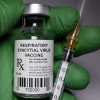 IJCP Editorial Team
IJCP Editorial Team
The General Population Lacks Insights about the Kinds of Cancers HPV Can Cause
Human papillomavirus is responsible for cervical, throat, and anal cancers.
A new study found a lack of awareness about HPV and the number of major cancers it can cause among people.
The Centers for Disease Control and Prevention reports that nearly all sexually active women and men become infected with HPV at some point.
In the new investigation, which will be presented today (Tuesday) at the American Association for Cancer Research's annual meeting 2023 in Orlando, USA, researchers scrutinized nationally representative survey data gathered by the Health Information National Trends Survey that observed U.S. adults' understanding of the virus's connection to cancer.The survey received responses from approximately 2,000 to 2,300 individuals annually, including responses for the year 2014 and every year from 2017 to 2020.
The study found that about two-thirds of respondents had heard of HPV, and about 70.2% of them were aware of the link between the virus and cervical cancer in 2020 (a significant 7.4% decline from 77.6% in 2014). Furthermore, only about 30% of them also knew it could cause throat or anal cancers.
The new findings arrive amid a surge of vaccine mistrust and a decline in child vaccination in the U.S. There has been prolonged resistance to the HPV vaccine, which was first approved in 2006 for girls and young women to prevent cervical cancer, but now has been updated to avoid anal, oral and head and neck cancer in men and women.

IJCP Editorial Team
Comprising seasoned professionals and experts from the medical field, the IJCP editorial team is dedicated to delivering timely and accurate content and thriving to provide attention-grabbing information for the readers. What sets them apart are their diverse expertise, spanning academia, research, and clinical practice, and their dedication to upholding the highest standards of quality and integrity. With a wealth of experience and a commitment to excellence, the IJCP editorial team strives to provide valuable perspectives, the latest trends, and in-depth analyses across various medical domains, all in a way that keeps you interested and engaged.














Please login to comment on this article